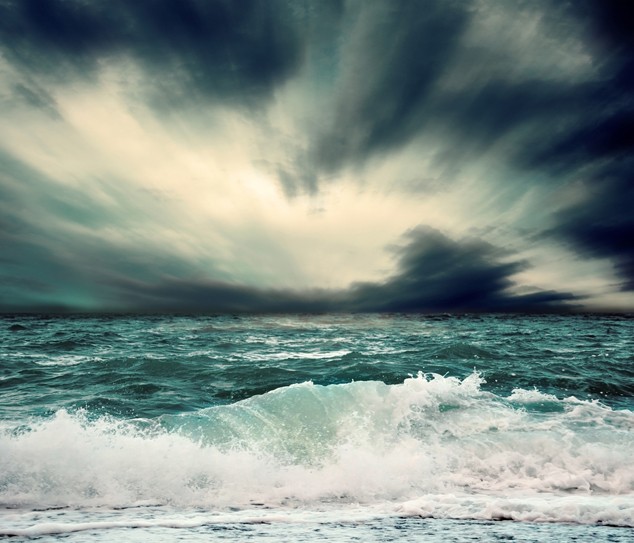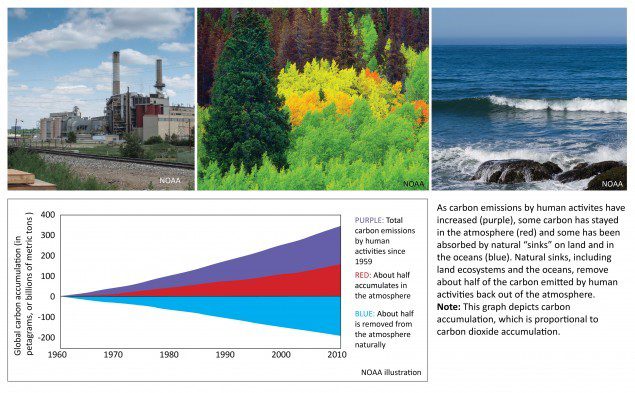Major Cocaine Bust: UK Border Force Seizes Record Shipment at London Gateway
In one of the UK’s largest drug seizures of the past decade, UK Border Force officers have seized cocaine with an estimated street value of £96 million (USD 130 million)...

Via NOAA
Earth’s oceans, forests and other ecosystems continue to soak up about half the carbon dioxide emitted into the atmosphere by human activities, even as those emissions have increased, according to a study by University of Colorado and NOAA scientists published today in the journal Nature.
The scientists analyzed 50 years of global carbon dioxide (CO2) measurements and found that the processes by which the planet’s oceans and ecosystems absorb the greenhouse gas are not yet at capacity.
“Globally, these carbon dioxide ‘sinks’ have roughly kept pace with emissions from human activities, continuing to draw about half of the emitted CO2 back out of the atmosphere. However, we do not expect this to continue indefinitely,” said NOAA’s Pieter Tans, a climate researcher with NOAA’s Earth System Research Laboratory in Boulder, Colo., and co-author of the study. The University of Colorado’s Ashley Ballantyne is lead author.
Carbon dioxide is emitted into the atmosphere mainly by fossil fuel combustion but also by forest fires and some natural processes. The gas can also be pulled out of the atmosphere into the tissues of growing plants or absorbed by the waters of Earth’s oceans. A series of recent studies suggested that natural sinks of carbon dioxide might no longer be keeping up with the increasing rate of emissions. If that were to happen, it would cause a faster-than-expected rise in atmospheric carbon dioxide and projected climate change impacts.

Ballantyne, Tans and their colleagues saw no faster-than-expected rise, however. Their estimate showed that overall, oceans and natural ecosystems continue to pull about half of people’s carbon dioxide emissions out of the atmosphere. Since emissions of CO2 have increased substantially since 1960, Ballantyne said, “Earth is taking up twice as much CO2 today as it was 50 years ago.”
The rest continues to accumulate in the atmosphere, where it is likely to accelerate global warming.
This new global analysis makes it clear that scientists do not yet understand well enough the processes by which ecosystems of the world are removing CO2 from the atmosphere, or the relative importance of possible sinks: regrowing forests on different continents, for example, or changing absorption of carbon dioxide by various ocean regions.
“Since we don’t know why or where this process is happening, we cannot count on it,” Tans said. “We need to identify what’s going on here, so that we can improve our projections of future CO2 levels and how climate change will progress in the future.”
Tans, Ballantyne and colleagues at the University of Colorado, including the Cooperative Institute for Research in Environmental Sciences, dissected the long-term records of CO2 levels measured by NOAA and the Scripps Institution of Oceanography at remote sites around the world, including the top of a mountain in Hawaii and the South Pole. Those CO2 levels reflect global averages of the greenhouse gas, which are affected by natural cycles as well as people’s activities.
The researchers also scrutinized national and international inventories or bookkeeping estimates of CO2emissions by people and compared those to the increasing atmospheric levels of the gas.
“The uptake of carbon dioxide by the oceans and by ecosystems is expected to slow down gradually,” Tans said. Oceans, for example, are already becoming more acidic as they absorb about a quarter of the carbon dioxide pumped into the air by human activities. “As the oceans acidify, we know it becomes harder to stuff even more CO2 into the oceans,” Tans said. “We just don’t see a letup, globally, yet.”
NOAA’s mission is to understand and predict changes in the Earth’s environment, from the depths of the ocean to the surface of the sun, and to conserve and manage our coastal and marine resources. Join us on Facebook, Twitter and our other social media channels.

Sign up for gCaptain’s newsletter and never miss an update

Subscribe to gCaptain Daily and stay informed with the latest global maritime and offshore news


Stay informed with the latest maritime and offshore news, delivered daily straight to your inbox
Essential news coupled with the finest maritime content sourced from across the globe.
Sign Up